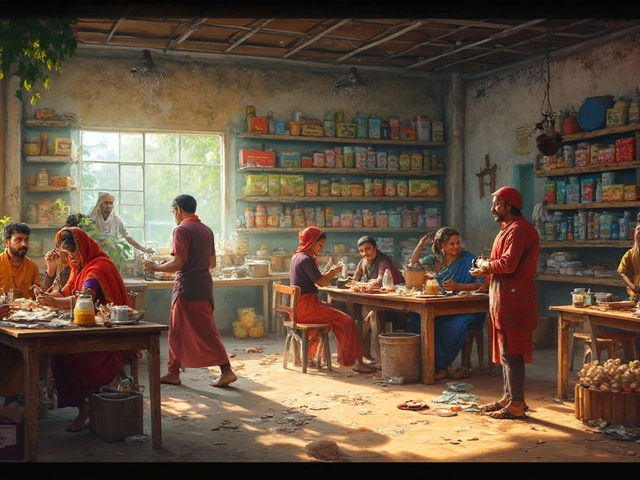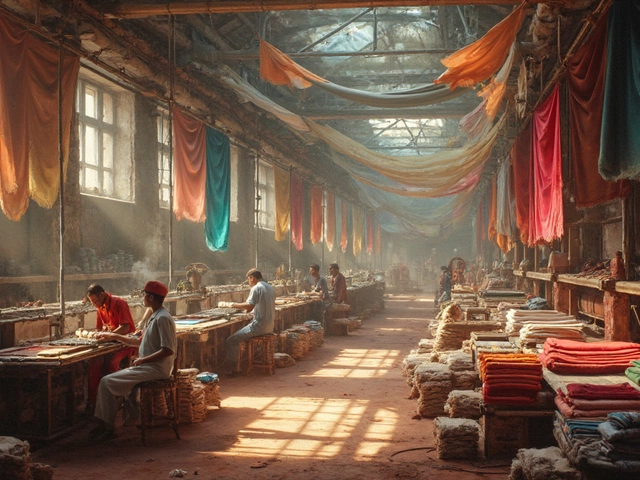Everyone's heard the classic questions: 'What job should I go for?' or 'Which industry is booming right now?' Some people just want job security. Others are hunting for a career that's not about to get replaced by a clever bit of code or a robot. And then there are those looking to invest, pivot, or just satisfy their curiosity about which sectors are topping the global growth charts in 2025. Honestly, there’s never been a moment when this kind of knowledge was more valuable. Knowing where the action is today could mean the difference between riding a wave and being left behind on the shore. So, which industries are hot right now?
What’s Powering Demand: From Technology to Old-Fashioned Needs
The tech surge isn’t slowing down anytime soon, but it's not just about gadgets and programming. Take artificial intelligence (AI) and machine learning; these used to sound like distant sci-fi, but now they're tangled through everything, even things you might not expect, like farming or health records. In New Zealand, there’s a huge push for agritech—basically using smart sensors and data analytics to squeeze more out of every hectare. But it's not just agriculture getting the upgrade; logistics, transport, and the world of finance are being transformed by automation and smarter data tools. Data from the World Economic Forum pegs tech roles—especially in software, cloud computing, and digital marketing—as not just surviving but soaring, with double-digit growth rates through 2028.
Everyone's talking about green energy, too. Solar and wind jobs are multiplying like never before, partly thanks to new government carbon targets and clever battery tech. Electric vehicle manufacturing is another blockbuster, with companies racing to fill the roads with more Teslas—in fact, in 2024, global EV sales nearly doubled compared to just three years prior.
Health is another massive engine of demand. If you’ve walked into a hospital lately, you’ll notice two things: way more technology than before, and not enough staff. Nurses, GPs, mental health specialists, lab techs—you name it. The COVID-19 shocks made things worse, yes, but the need isn't going away because the world’s population is still getting older, and people expect better, faster care. Add digital health and telemedicine to this picture, and you’ve got a sector in desperate need of more hands (and brains) on deck. Just ask the New Zealand Ministry of Health and they’ll confirm recruitment is a top priority in 2025.
And then there's food. No matter what the economy does, people need to eat. But there’s a twist: global supply chains are under pressure, there’s unpredictable weather, and people, especially Gen Z, want healthier and more sustainable choices. So, food processing, vertical farming, plant-based alternatives, and packaging solutions (think compostable, not landfill) are seeing major investment and job growth.
Manufacturing is another chapter no one should skip. Despite the AI hype, some kinds of making and building are very much in demand. High-end electronics, smart appliances, specialty pharmaceuticals, and advanced construction materials—these are not just for Silicon Valley or Shanghai; local manufacturers right here in New Zealand are thriving if they get the mix of tech, quality, and exportability right.
Why These Industries? The Real Drivers Behind the Hype
If you follow the money, the picture gets clearer. Investors want places to park their cash where things won't just grow, but boom. That’s why so much capital is flowing into industries like renewable energy, health tech, and advanced logistics. Venture capital funding for agritech in Australasia jumped by over 45% in just the past year. The rise of AI didn’t just create coders; it also spun off compliance officers, cybersecurity specialists, ethics consultants, and a wave of creative problem-solvers. "Innovation is the main engine of industry resilience in a volatile world," says MIT's Dr. Erik Brynjolfsson.
"The best opportunities today are often at the intersection of technology and crucial human needs—energy, food, health, and the way we communicate."
Demographics are another huge factor. The global population is aging—especially in developed countries. That brings gigantic demand for long-term care, rehabilitation, and all the services older adults require to stay active and independent. At the same time, younger people want careers that matter. They're more likely to chase jobs that don’t just pad their wallets but actually fix things—climate change, hunger, you name it. This means boom times for sustainability-focused companies, home-grown food producers, recycler-startups, and clean-tech innovators.
Don’t ignore geopolitics, either. The last few years have taught the world that global supply chains are fragile. The war in Ukraine, COVID-19, and shipping crunches in the Red Sea are prompting countries like New Zealand to invest in local manufacturing. There’s suddenly extra cash for “reshoring”—bringing production closer to home for everything from medicine to critical electronics. And yes, that’s creating jobs in what some saw as old-school industries.

How to Break In: Tips, Skills, and The People Getting Hired
So, suppose you're keen to ride the next big wave and wonder where to start. Here’s something you might not expect: most of these high-demand industries want both the techy types and the hands-on practical folks. Sure, in health, doctors and software engineers are obvious picks. But there’s need for project managers, compliance officers, clean energy installers, logistics planners, and even creative marketing pros who can explain new products without making your eyes glaze over.
For anyone just starting out, you don’t necessarily need a fancy degree. Stackable micro-credentials—in renewable energy basics, AI programming, health informatics, food safety—are popping up everywhere, sometimes free and often quick to complete. The Universities of Auckland and Otago both offer online courses targeted right at these job markets. Apprenticeships aren’t just for trades anymore; you can find them in robotics, biotech, even virtual reality design.
If you’ve got experience, don’t get stuck thinking you can’t pivot. Electric car production, for example, desperately needs skilled auto mechanics, supply chain managers, and people who understand electronics. The same goes for food processing—companies are hiring people who can see both the big picture and the tiny details, from food scientists to packaging designers to machine operators who know how to fix a jammed conveyor line in minutes. Even government agencies are snapping up talent for green infrastructure, compliance audits, disaster response, and more. There’s a myth that all these new jobs are in the city—honestly, remote work in tech, health consulting, and digital marketing means you could be sipping coffee in Raglan while meeting with an Australian start-up or a medical clinic in Wellington.
Here’s one practical tip: hunt for industries that combine global trends with local needs. If you’re in Auckland or Canterbury, agritech, robotics, and logistics firms are hiring. Down South, watch renewable energy and tourism-related tech (yes, people are returning for adventure holidays and want safe, smart, efficient experiences). The government’s own job boards, like Careers.govt.nz, offer real-time snapshots of what’s hot, along with practical guides for retraining that won’t set you back years or thousands of dollars.
Looking Ahead: What’s Next for High-Demand Industries?
Predicting the future is a risky business, but a few things are clear. Automation will keep ramping up—but not everything will be wiped away by robots. As jobs change, new roles are popping up: carbon accountants (who track a company's emissions), “digital twins” engineers (who build virtual models of everything from machines to entire factories), and sustainability officers (whose job is to make sure firms don’t just talk green but actually deliver results).
Technology, once a box for the IT crowd, is now something everyone needs to get comfortable with—whether they're running a dairy farm, a hospital, or a car repair shop. As work gets more complex, soft skills will matter more than ever. Teamwork, creative problem-solving, and curiosity are ranked as vital by leading employers. Even in tech firms, a people-first approach pays off. As one recruiter at a top NZ software company put it: "Code can be taught, but curiosity and adaptability are much harder to find."
Industries that tap into climate resilience are set for wild growth, especially as extreme weather keeps showing up in the news. Construction companies specializing in green buildings, advanced water management, and disaster-proof infrastructure are advertising roles up and down the skills ladder. And if you want the ultimate job security? Look at health, aged care, and food—these can’t be outsourced to a drone, and with a growing population (and more demanding one), they’ll always be at the core of a thriving economy.
So if you’re mapping a career, eyeing an investment, or simply following the next big thing, keep an eye on the zones where tech, health, climate, and human ambition meet. That's where demand isn’t just high—it's set to explode. Learn fast, adapt smart, and look for ways to join the dots between what people need, what’s possible, and what still hasn’t been built. That’s the sweet spot, and it's where tomorrow's opportunities will keep coming, long after today’s trends move on.





Write a comment